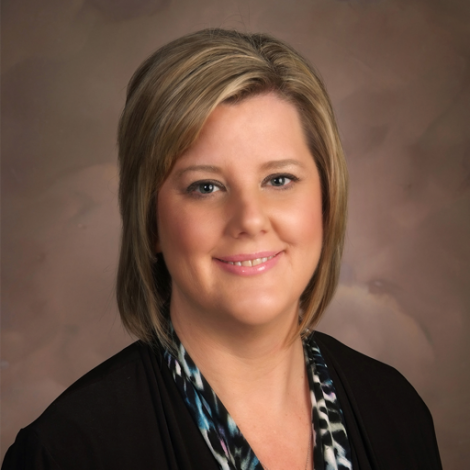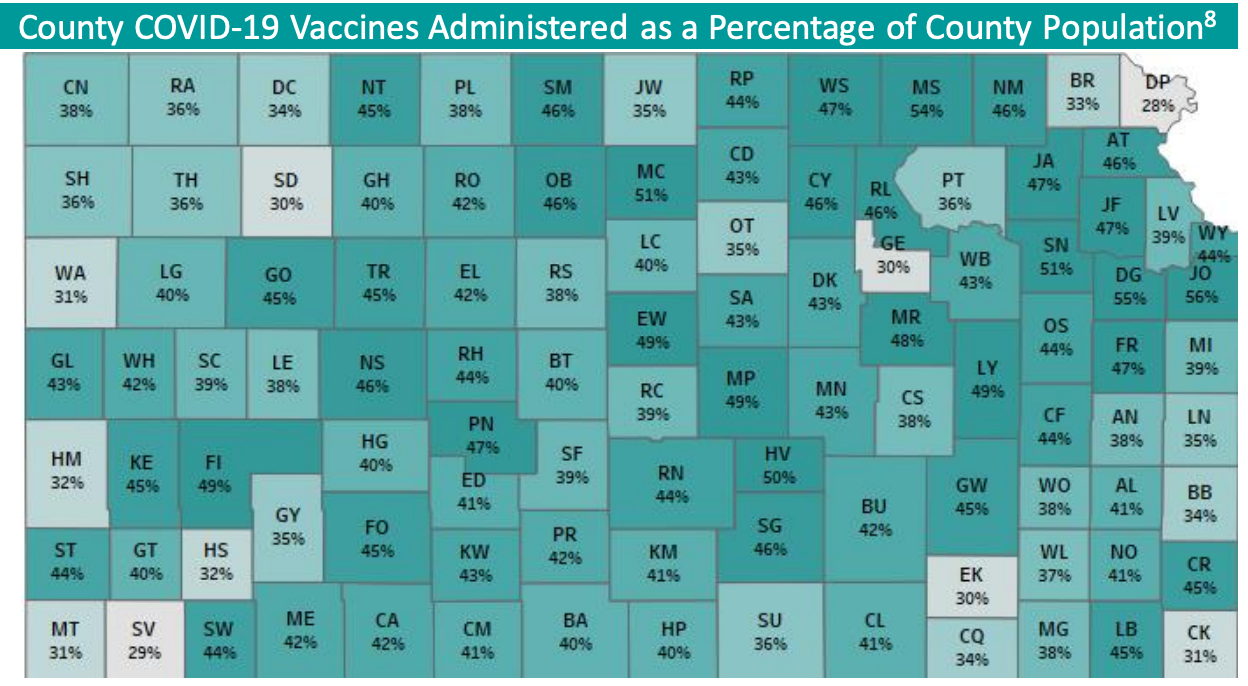
Hays Post
"Get a vaccine and don't get sick."
With the recent spike in COVID-19 cases in and around Ellis County, Dr. Heather Harris, chief medical officer at HaysMed, said increasing the local vaccination rate remains the best way to curb another virus outbreak.
"The vaccine is very safe. Over 1 billion people in the world have received it, and there is no data that shows there is any major concern for safety," she said. "People are dying from COVID. They're not dying from the COVID vaccine."
With numbers increasing at a pace not seen since February, Harris said the influx of patients has put a strain on HaysMed's patient capacity. As of Friday, there were 17 COVID inpatients in the hospital — seven in the intensive care unit.
The average age of COVID inpatients since the delta variant began affecting Ellis County has dropped to age 53.
"It's younger people being affected, for the most part healthy," she said. "These are not sick people ... and they're becoming very ill."
Vaccinated vs. unvaccinated
Of the 17 patients at HaysMed on Friday, only two were vaccinated — and those patients have an underlying health condition that makes the vaccine less effective.
"We want people to be healthy. So to see younger and younger people becoming hospitalized, becoming very sick is disheartening — especially now that there's a vaccine," Harris said.
According to the Kansas Hospital Association's Aug. 18 update, 42 percent of Ellis County residents have been partially or fully vaccinated, just less than the statewide average of 43.8 percent. Several northwest Kansas counties have vaccination rates below the state average, with Sheridan County's 30 percent rate being among the lowest in the state.

Harris expected those numbers to improve.
"We're seeing a lot of people get vaccinated right now. There has been an uptick," she said.
There have been a handful of "breakthrough" COVID cases in vaccinated individuals locally but Harris said the vaccine still positively affects those patients.
"No healthy adults with healthy immune systems have been hospitalized who've had the vaccine," she said.
Delta=COVID
HaysMed assumes all COVID cases are likely caused by the more contagious delta variant, noting it takes three weeks to have test samples returned to reach that determination.
"We're no different than the rest of the country — 95 percent of the new cases are delta," Harris said.
The symptoms of delta have been different, she noted.
"Very high fevers — we didn't see high fevers last time. It's very variable (for each individual), but it looks like a terrible cold, nasal congestion, headaches, cough ... shortness of breath, low on oxygen. We're starting to see ... diarrhea, which we've only seen in the last few weeks."
With allergy season also here, Harris offered advice familiar throughout the pandemic.
"If you don't feel good, stop. Don't go to work. Don't go to school. Stay home, and go get tested," she said, noting current testing offers a one-day turnaround on results. "That way, we can triage the right people and limit the spread.
"People are doing a better job this time. We're starting to see people respond quicker," she added. "Instead of not feeling good for a week and then coming in, people are coming in after a couple of days."
Transfers
The influx of COVID patients has put a strain on HaysMed's ICU capacity. As of Friday morning, the hospital was not accepting out-of-county transfers.
"This has caused the hospital to be very busy with very sick people," she said. "If you have a bad car wreck ... you're not coming."
Updated 4:30 p.m. Friday to clarify quote.
Harris noted hospital stays for recent COVID inpatients have been lengthy.
"This is not a quick illness. They're being hospitalized for weeks," she said.
Vaccinations come into play with hospital capacity, as well. Noting the 15 unvaccinated COVID inpatients at HaysMed, Harris said, "if everyone would have been vaccinated, we should only have two (of those) people in the hospital right now."
Vaccines for youth
With individuals as young as 12 eligible to be vaccinated, Harris said she "100 percent" believes those younger individuals should receive the shot.
"The risk of them getting sick with COVID outweighs anything the vaccine could cause. One hundred percent on the 12 and up," she said, noting a COVID diagnosis would mean missing school, school activities and other social opportunities. "It takes several weeks to recover from COVID, to quarantine. We want them to stay healthy."
She appreciated Hays USD 489 had put a plan in place that would closely monitor students, staff and teachers, as well as providing for contingencies like a mask requirement should cases spike among the school population.
"They're on it. They're really watching. They did a great job last year, so kudos to them," Harris said. "Our school nurses are working their buns off."
Students — even the youngest — "did amazing" with masks last school year, she said, noting that should it reach that point, she expected the same behavior from students in the future.
Misconceptions
With a flurry of misinformation on social media, Harris quickly pointed out two myths she wanted the public to understand clearly.
"This vaccine is safe — really safe," she said, noting the speed of release of the vaccine was aided by years of prior research. "The technology they used to create the vaccine has been out for many years. Because the mRNA technology was there, they were able to match it to the spike protein of this particular virus."
She also pointed out the misconception the vaccine would have an impact on fertility in women.
"It has zero effect on fertility," Harris said. "This new variant is really affecting pregnant women and newborns more than the first. The risk of someone pregnant getting sick is very high."
RSV
Another recent development has been a surge in the number of cases of the respiratory disease RSV.
Harris said doctors remain unsure if there is any connection between COVID and the RSV upswing.
"We're perplexed because there was not a lot of RSV in the winter when we normally see it," she said. "(COVID) has changed the landscape of illness, but RSV is definitely affecting the younger kids .. and some adults."
Around the corner
With the return of students to Fort Hays State University and the beginning of school and school events, Harris expected Ellis County cases to spike again — almost exactly a year from when the initial spike started.
"Rates will go up the next several weeks," she said. "There's a fix for that. It's called a vaccine."






